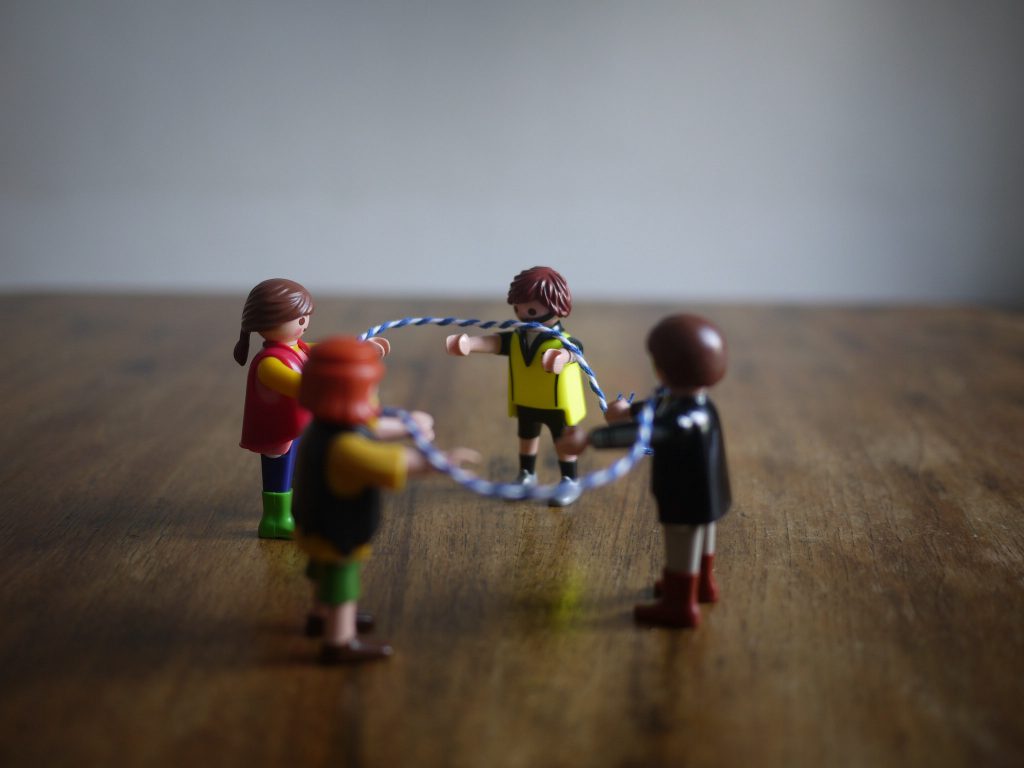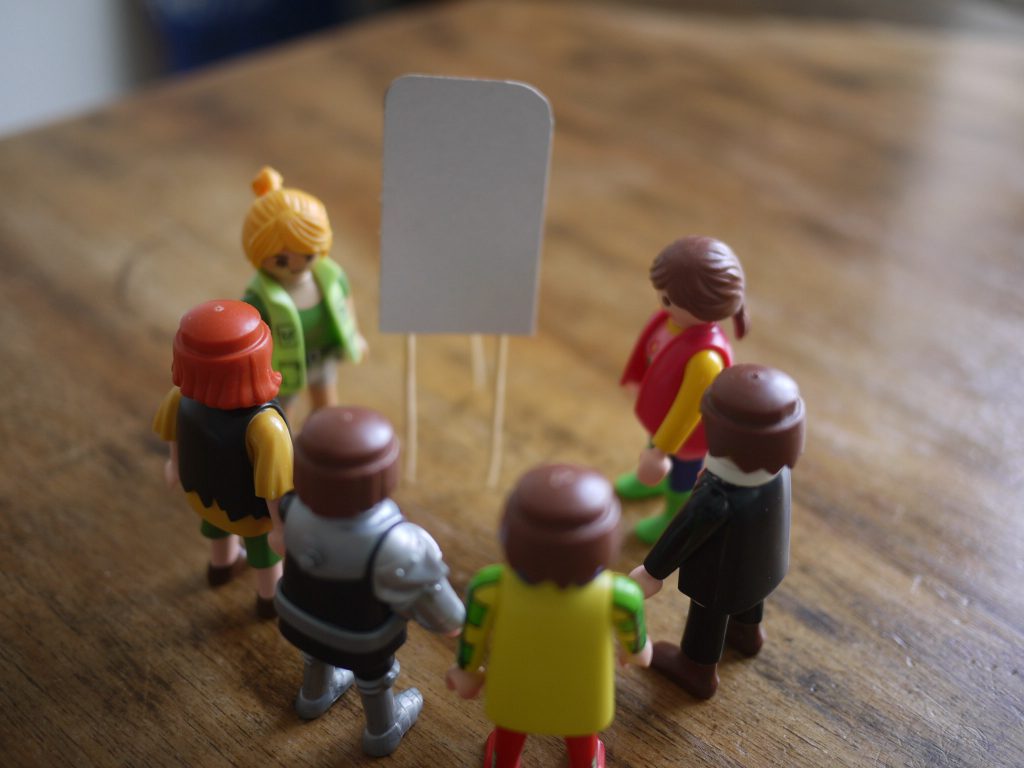With the start of the autumn season, our five experts for working with and in groups have gained further experience of what it means to work with groups under the special conditions that currently shape our everyday lives. The current #grumo contribution is about dealing with distance rules and different needs and roles.
„I find it difficult“ – Maria is visibly frustrated. Next week her course is due to start and she is preparing the teambuilding units together with Beate. „We have to reschedule everything, most of the methods we normally use don’t work because of the distance rule and I’m also looking forward to discussions with a mask on.“ One by one, the others trickle in – at the very end, Rudi also arrives, who has agreed to share his experiences on teambuilding with distance. He already had the first units last week and after some initial confusion it worked out well.
A gift
„I know you don’t want to hear this now,“ Rudi looks at Maria mischievously, „but somehow the topic for the group start is almost a gift: everyone is concerned, everyone has an opinion on it, the discussion is quickly quite emotional and you almost can’t not take a position.“ Maria grimaces sceptically. „I don’t know, I rather have the feeling it makes everything a bit more tedious – people are not allowed to go around, and if they do, then only with a mask, the chairs are much further apart and when something takes place outside, the acoustics are usually so bad that everyone has a hard time listening.“ Rudi admits that his conditions were exceptionally good. Talking about the current situation immediately brought the group a giant step closer to each other. „There was just quite a lot of openness about fears, frustrations and anxieties on quite a few different levels,“ he shares his observation with the others.
Different needs, different responsibilities
Paul intervenes: „Well, I haven’t really changed my seminar design: I held the get-to-know-you exercises and small group exercises exactly as I always do. I just gave people more time to find each other at an appropriate distance or – when they came out to the pin board – made sure that the distance between them was wide enough. But all that actually worked well. They took off the mask when they were seated, so discussions were also possible in a normal way.“ He shrugs, „It all took a bit longer, but by the time the routine was established, we’d almost forgotten about Corona.“
Yasmine hasn’t said much yet that evening, now she speaks up too. „I already have the feeling that the participants are more uncertain about how they should behave. I made it clear in the clarification of expectations that they should also think about what they need in order to feel safe when working with each other. Their needs are quite different. After that was clarified, I had the impression that things were actually running smoothly. I also had the opportunity to make my position clear.“ A somewhat angry discussion ensues because Maria says she doesn’t feel like constantly drawing the participants‘ attention to distance rules and mask obligations. Rudi says that he feels responsible for this. After some back and forth, they agree that it is probably important to communicate one’s own role clearly. And depending on whether you are still a representative of the organiser or a booked trainer, your role is probably a little different.
Like kneading dough with one hand
Beate and Maria now have a bit more of a plan for how they want to set up their seminar and Maria is no longer quite so despondent, yet still seems a touch depressed. „You know,“ she finally says, „I’m just afraid that my way of training doesn’t work anymore. In a group I feel like a fish in water. I like to get in touch with the others and I need a lot of facial expressions, body language, feedback and interaction for my work. I like to walk into the circle and chat and joke with the participants during the coffee break. Now I have the impression that I don’t have much of that at my disposal. It’s like kneading dough with one hand: a bit tedious and not quite as productive.“ The others nod in agreement. All five of them have already thought about what this means for the future of their profession, if the situation does not change again, but spacing rules are necessary for even longer.
Creative adaptation
Beate steers the conversation back to the planned seminar introduction: „We’re already doing that. Many methods can be adapted if you are a bit creative,“ she says and points to two posts in the REFAK blog, one on methods with distance and the other on learning with distance. „I think it is also important to explain our situation to the participants. Most of them might not have thought about the fact that it is a new challenge for us to lead teambuilding with distance.“ Maria and Beate promise to report briefly next time on how the start of the course went for them. „I also wanted to tell you about a weird experience I had recently during a group coaching session,“ says Paul, when the others were almost saying goodbye. „But let’s just postpone that until our next meeting. This much in advance,“ Paul reveals, „it has something to do with hierarchies within groups.“ The others have become curious and are looking forward to the next time all the more.
Authors: Gerda Kolb and Irene Zavarsky
Lust auf mehr? Zu allen Beiträgen der Serie kommst du HIER!

Dieses Werk ist lizenziert unter einer Creative Commons Namensnennung-NichtKommerziell-Weitergabe unter gleichen Bedingungen unter gleichen Bedingungen 3.0 Österreich Lizenz.
Volltext der Lizenz



